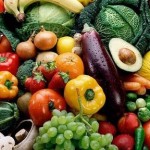 The Environmental Working Group (EWG) has now published its 2012 Shopper’s Guide to Pesticides in Produce (1) which has been compiled from data obtained from the U.S. Department of Agriculture (USDA) and the Food & Drug Administration (FDA). Nearly 70 percent of the fruits and vegetables had detectable pesticide residues after they had been washed or peeled.
The Environmental Working Group (EWG) has now published its 2012 Shopper’s Guide to Pesticides in Produce (1) which has been compiled from data obtained from the U.S. Department of Agriculture (USDA) and the Food & Drug Administration (FDA). Nearly 70 percent of the fruits and vegetables had detectable pesticide residues after they had been washed or peeled.
The Most Contaminated
There have been some changes from last year’s list although Apples still remain supreme as being the most contaminated on the list. The top 12 most contaminated fruits and vegetables, also known as the Dirty Dozen, are as follows with the most contaminated first: Apples, Celery, Sweet Bell Peppers, Peaches, Strawberries, Nectarines (Imported), Grapes, Spinach, Lettuce, Cucumbers, Blueberries (Domestic) and Potatoes. This year, a Plus category has been added to the Dirty Dozen for Green Beans and Leafy Greens ( Kale and Collard Greens ), because they were found to be commonly contaminated organophosphate insecticides which are known to be neurotoxic. These organophosphates also showed up in some samples of Green Bell Peppers and Nectarines. Also, Baby Food Green Beans tested positive for five pesticides, including two organophosphate insecticides.
The Least Contaminated
At the other end of the spectrum, the 15 least contaminated fruits and vegetables, known as the Clean Fifteen, are as follows with the cleanest first: Onions, Sweet Corn, Pineapples, Avocado, Cabbage, Sweet Peas, Asparagus, Mangoes, Eggplant, Kiwi, Cantaloupe (Domestic), Sweet Potatoes, Grapefruit, Watermelon and Mushrooms. ( It should be noted that some Sweet Corn is genetically modified to produce the bacterial pesticide Bt Toxin, and the only way to be certain of avoiding this is to purchase corn that has been raised organically.)
The EWG Shopper’s Guide is accompanied by the video below in which the renowned physician and health commentator Dr. Andrew Weil gives his recommendations based on the findings.
© Christopher J. Jones, M.Sc., Ph.D.
Reference
1. Environmental Working Group (2012) The Shopper’s Guide to Pesticides in Produce. http://www.ewg.org/foodnews/summary/




Comments on this entry are closed.